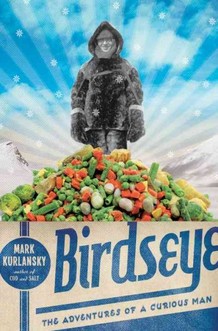I’ve always been a fan of the frozen food.
With four kids to feed, it was convenient, and if you want to eat local, get the fart-inducing cruciferous vegetables like cauliflower, broccoli  and the always popular bok choy from the freezer section.
and the always popular bok choy from the freezer section.
Chapman mentioned a road trip we took about a decade ago with the Ontario Processing Vegetable Growers (that’s in Canada) where we saw the amazing lengths farmers and processors go to keep frozen and canned product safe.
I remember walking into the IQF (individually quick frozen) unit that was freezing corn: it was cold.
Now, with its pulse on a changing nation, state-sponsored jazz, otherwise known as NPR (National Public Radio) is reporting the frozen food folks are tired of being left in the cold.
“What we call fresh in the supermarket is really better termed raw,” says Kristin Reimers, a registered dietitian and manager of nutrition for ConAgra Foods. “A lot of times, those vegetables have been transported for days, and then sit. It could be a matter of weeks between when they’re picked and consumed.”
Frozen vegetables, she says, are “probably more nutrient-rich than many of the raw vegetables in the produce section.”
According to NPR, the frozen food industry just hired two big ad agencies for a $50 million campaign to convince us that frozen food is good.
ConAgra is one member of the new Frozen Food Roundtable, along with General Mills, Heinz, Kellogg and other big manufacturers. They have ordered up a campaign “designed to change the way consumers think and feel about frozen food by promoting positive messaging regarding the benefits and attributes of frozen food,” according to Ad Age.
Sure, but don’t make consumers sick with frozen pot pies, and then blame consumers. Frozen and safe. It’s a slogan. Publish the data and market it.
And as noted by NPR, stay away from the meals – too much fat and salt. But I always have a bag of frozen berries, even though I grow my own, because farming is hard, and if someone had to rely on my skills  for food they would be hungry. And a variety of veggies. Little kids love frozen corn and peas. Sorenne is four, but will still munch on the ones she doesn’t spill on and into the couch.
for food they would be hungry. And a variety of veggies. Little kids love frozen corn and peas. Sorenne is four, but will still munch on the ones she doesn’t spill on and into the couch.
Frozen and safe.
Oh, and Michael Pollan did not invent cooking with the family. See that pic of me and Sorenne on every blog post? I did that with all the girls, and the oldest is about to turn 26. Hanging out with the 23-year-old last month (that’s her, right, with her boyfriend who stole my hair style from a decade ago to apparently impress my daughter; nah, it’s not that, she thought I was a dork), we mainly talked – and did — cooking. For those in North America, the Pollan bit from Colbert last night starts about the 15 minute mark on the video at http://www.colbertnation.com/full-episodes/mon-april-22-2013-michael-pollan. I’ll post the clip when it’s available.
 This situation was first discovered in July, when the temperature in one frozen food truck reached 33 degrees Celsius, which is grossly in violation of food safety laws. Therefore, the CPC decided to cooperate with local health and transportation authorities to inspect additional logistics companies.
This situation was first discovered in July, when the temperature in one frozen food truck reached 33 degrees Celsius, which is grossly in violation of food safety laws. Therefore, the CPC decided to cooperate with local health and transportation authorities to inspect additional logistics companies.




 was very curious about nature. He had a nickname for a while — other kids called him ‘Bugs.’ He was interested in all these slimy little things."
was very curious about nature. He had a nickname for a while — other kids called him ‘Bugs.’ He was interested in all these slimy little things."